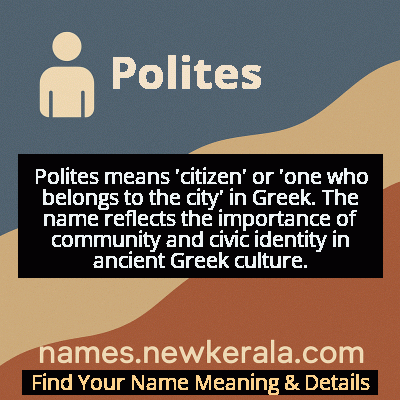Polites Name Meaning & Details
Origin, Popularity, Numerology Analysis & Name Meaning of Polites
Discover the origin, meaning, and cultural significance of the name POLITES. Delve into its historical roots and explore the lasting impact it has had on communities and traditions.
Name
Polites
Gender
Male
Origin
Greek
Lucky Number
6
Meaning of the Name - Polites
Polites means 'citizen' or 'one who belongs to the city' in Greek. The name reflects the importance of community and civic identity in ancient Greek culture.
Polites - Complete Numerology Analysis
Your Numerology Number
Based on Pythagorean Numerology System
Ruling Planet
Venus
Positive Nature
Harmonious, responsible, caring, and artistic.
Negative Traits
Overly idealistic, superficial, possessive, or jealous.
Lucky Colours
Pink, turquoise.
Lucky Days
Friday.
Lucky Stones
Diamond, turquoise.
Harmony Numbers
2, 3, 9.
Best Suited Professions
Artists, musicians, teachers, healthcare workers.
What People Like About You
Warmth, nurturing nature, artistic flair.
Famous People Named Polites
Polites of Troy
Mythological Prince
Youngest son of King Priam, known for his swift running abilities in the Trojan War
Polites (Odyssey)
Mythological Companion
Loyal crew member of Odysseus transformed by Circe and later restored
Polites of Epirus
Ancient Ruler
Molossian king known for diplomatic relations in 4th century BCE Greece
Name Variations & International Equivalents
Click on blue names to explore their detailed meanings. Gray names with will be available soon.
Cultural & Historical Significance
Extended Personality Analysis
Those bearing the name Polites typically exhibit a strong sense of community responsibility and social awareness. They are often natural mediators who excel at understanding multiple perspectives and finding common ground in conflicts. Their personality tends to blend practical wisdom with diplomatic skill, making them effective leaders who lead through consensus rather than coercion. The mythological background suggests individuals who are resilient in the face of adversity and capable of significant personal transformation while maintaining their core values. They usually demonstrate loyalty to family and community, combined with the adaptability to navigate changing circumstances. These individuals often possess organizational abilities and a talent for bringing people together around shared goals, reflecting the name's origins in civic life and community building.
Modern Usage & Popularity
In contemporary naming practices, Polites remains quite uncommon but maintains a presence among families with Greek heritage or strong interest in classical mythology. The name sees occasional use in academic and literary circles, particularly among classicists and those appreciating its historical depth. While it doesn't rank on mainstream baby name charts, it enjoys niche popularity among parents seeking distinctive names with classical roots and meaningful cultural connections. The name's rarity in modern times adds to its appeal for those looking for unique yet historically significant names. It occasionally appears in Greek diaspora communities as a way to preserve cultural heritage, and its use in modern Greece, while not widespread, continues as a traditional choice with deep historical resonance.
Symbolic & Spiritual Meanings
The name Polites carries rich symbolic meaning centered around community, citizenship, and social integration. It represents the ideal of the engaged citizen who actively participates in community life while maintaining individual integrity. Symbolically, it bridges the gap between personal identity and collective responsibility, embodying the Greek philosophical concept that human fulfillment comes through meaningful participation in society. The mythological associations add dimensions of transformation and resilience—the ability to undergo profound changes while remaining true to one's essential nature. The name also symbolizes the importance of social bonds and mutual obligations, representing the idea that individual achievement gains meaning through its contribution to the common good. It stands as a reminder that true leadership emerges from service and that personal identity is inextricably linked to one's role within the larger social fabric.

